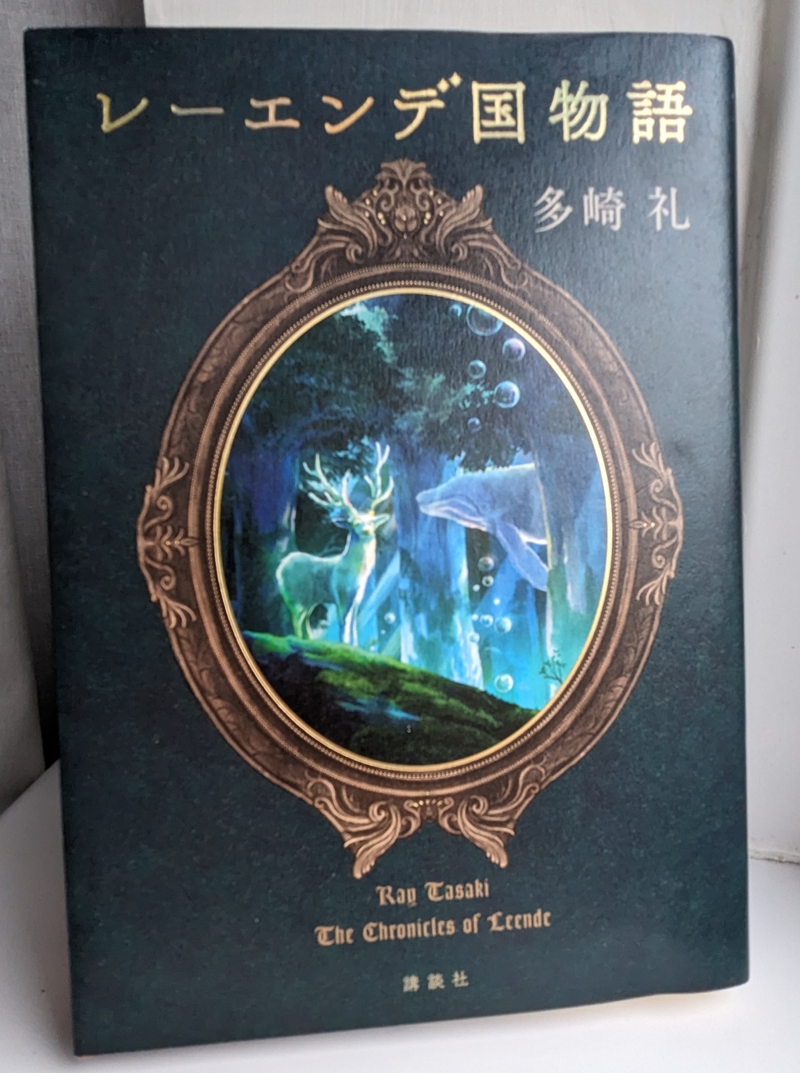The Chronicles of Leende
レーエンデ国物語 (Reiendekoku Monogatari)
2024-01-11T14:57:55Z

Summary
Julia Shreiber, daughter of Hektor Shreiber, hero and captain of the knights of the country of Shreiber, travels with her father to the land of Leende, a beautiful country of mystery and magic, where a young man named Tristan de Elwyn acts as their local guide. This land is feared by outsiders due to the silver plague, an illness with no cure whose victims die as hard silvery scales spread across their body, but Julia comes to love the land, and learns how to live her life as she wants it, not as others want her to.
About the Book
I'm not doing an About the Author section in this one because, guess what, it's another Ray Tasaki book! If you haven't read about them before, checkout my reviews here and here for the About the Author. At this point, I might as well change the subtitle of my blog to “A Ray Tasaki fanblog”. Nah, not quite yet. If you don't care how I came across this book, skip to the review.
Anyway, I picked up a real physical copy of this book while in Japan this past summer. I'd had every intention of wandering bookstores, picking up whatever fantasy and science fiction books looked interesting, but the way Japanese bookstores are laid out made that very difficult. Despite visiting several throughout my trip, I remained empty handed until one fateful day I walked in a store and saw this book on a display front and center in the “What's Hot” kind of section. My thought process went something like this: Ooh, pretty book → That looks fantasy-ish → Omg, Ray Tasaki?! → Buy.
It's a good thing I bought it too, because this series has been getting Tasaki quite a lot of attention (it's currently up to book three, two came out right when I got back from Japan). They've even released The Festival of Sparks with a beautiful new cover. Want to guess how much I paid to have volume two and three and the fancy new The Festival of Sparks shipped to me? More than I care to admit. Anywho, onto the review.
Review
I think this book might have the best opening line/passage of any Ray Tasaki book I've read so far:
革命の話をしよう。
歴史のうねりの中に生まれ、信念のために戦った者達の
夢を描き、未来を信じて死んでいった者達の
革命の話をしよう。
Let's talk revolution
For those born in the changing tides of history, who fight for their convictions. For those who hold dreams in their hearts, believing in the future as they go to their deaths.
Let's talk their revolution.
Well, I don't think my translation here does it justice, it's just a quick thing for this review! But I love that it sets expectations and tone for the entire series with just those few lines. By which I mean, without this introduction, we could be at risk of assuming this story is simply about Julia, Hektor, and Tristan, and their experiences and relationships. In a way, it definitely is about that. This is their story, the story of these three people, but it is also the story of something much greater. This book lays the groundwork for a series that spans history, because keep in mind, this is The Chronicles of Leende, the land, not just the characters of this book.
So, we have a series that is bigger than the characters of this book, but that doesn't mean the characters are lacking in any way whatsoever. Julia starts the book as a teenage girl who believes her only value is as a pawn in some political marriage, and Tristan starts out as a disenchanted young man, but the two grow. Hektor doesn't change much, and he does have a bit of White Knight Syndrome going on, but it seems like an intentional character trait, not just poor character creation.
Much like Tasaki's other works, there is no shying away from difficult topics. There's xenophobia a plenty, racism, rape (off screen only) and being a child born from that, religious fanaticism, superstition, forced marriage, and just general political stuff. I wouldn't go so far as to call the book “dark”, however. There's always a bit of light there, and hope.
Potential Translation Issues
Names. It's always names, isn't it? Well, often. First off, everyone from Shreiber has German-esque names, which means Julia isn't pronounced “Julia,” it's “Yulia”. Easy enough to get that across in Japanese, but how do you tell English-speakers readers that they shouldn't read this very common name in the way they're used to reading it? Then, the tribe that Tristan belongs to uses Welsh names. However, they use a naming system based off location, as in Tristan de Elwyn, Elwyn is where he lives, but Welsh doesn't have a system for location-based surnames with a particle like that (they have one for “son of” which is “ap”). That “de” is actually French. Do we just…accept this is a fantasy book and therefore it doesn't really matter if it's Welsh names with a French system?
And then there's the title. If it's not names, it's the title. Though to be fair, this is twofer. The name of the region, “Leende,” is the romanization used by Tasaki. I'm just afraid it would lead English speakers to pronounce the name quite far off of what the Japanese is. I would probably read Leende as leen-day, when it should really be closer to lay-en-day, which means I might want to talk about changing that romanization for an English translation. But now that I think about it again, maybe le-ende is something important? Wait. Leende is a town in the Netherlands and might be close in pronunciation. See, this is tricky
Final Ratings
How many stars? 5 out of 5 (I love it! Is it…even better than The Festival of Sparks?!)
Would I want to translate it? Yes. Pretty please with a cherry on top.
